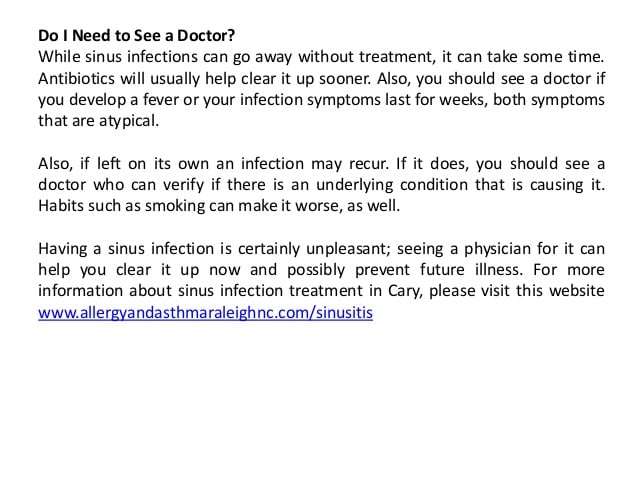What Are The Different Types Of Sinus Infections
Sinusitis is categorized based on how long the condition lasts as well as its frequency:
- Acute sinusitis usually lasts a few weeks, but less than a month. There is a subcategory of acute sinusitis, called recurrent acute sinusitis, which occurs when someone gets four or more sinus infections in a year, with symptoms resolving after each one.
- Subacute sinusitis lasts one to three months.
- Chronic sinusitis lasts three months or more.
When A Sinus Infection May Be Dangerous
A sinus infection occurs when the tissue lining in your sinus cavity becomes swollen or inflamed. When your sinuses are blocked, they become a breeding ground for bacteria and viruses that can lead to an infection. Thats why its best to visit your doctor at the first signs of a sinus infection. Otherwise, it could lead to a chronic condition. Heres how to know if your sinus infection has developed into something more dangerous:
What Can I Do
While you wait for your infection to run its course, you can take steps at home to feel better.
Look into nasal sprays. Store-bought saline nasal spray loosens up mucus, temporarily clearing it from your nasal passages. A steroid nasal spray like fluticasone may help tame inflammation, especially if you have underlying allergies. Unsure about using a steroid? Follow package directions and go to your HCP with questions.
Be wary of decongestant nasal sprays, like oxymetazoline . Using them for longer than three days could cause rebound symptoms persistent stuffiness eased only by the spray itself. Dryness and addiction are also possibilities.
Embrace sinus rinses like the neti pot. Many sinus infection veterans swear by nasal irrigation systems, such as plastic squeeze bottles or teakettle-shaped neti pots. These devices are filled with a sterile saline solution and used to flush snot from your sinuses.
Neti pots and their ilk are widely available and typically safe, as long as you handle them properly. Dont use water directly from your tap. Instead use distilled water, a sterile saline solution or water that has been boiled and then cooled.
Try over-the-counter medicines. Experts recommend analgesics including acetaminophen , ibuprofen and aspirin to ease pain, as well as decongestants like pseudoephedrine to alleviate the pressure of congestion.
Finally, you may want to avoid flying or scuba diving, since either can aggravate sinus pain.
Also Check: Sinus Infection Vs Flu Vs Cold
Common Causes Of Sinus Infection
You can easily get sinus infections, depending on your environment. If you stay in a house filled with mold and dust, you can get sinus infections more often than other people. You also get a higher chance of developing the infection when you have a cold or allergy.
Other people with the following also have a higher risk of getting sinus infections:
- Asthma
- Weak immune system
- Often smokes or drinks
People with other medical conditions, such as HIV, also risk getting a sinus infection. Try to take note of your allergies and medical conditions as not to get complications. You could get complications like vision problems and skin infection.
How Is A Sinus Infection Diagnosed And Treated

Your doctor will give you a physical exam and take your medical history. You might get a CT scan of your sinuses.
Your doctor may prescribe medication. They may recommend antibiotics if your symptoms go on for more than 10 days. , antihistamines, and other drugs help lessen the swelling in your sinuses and nasal passages.
Steam and hot showers can help you loosen mucus. Your doctor may also suggest nasal saline to wash mucus from your nose.
In rare cases, when a sinus infection doesn’t go away, long-term antibiotics or surgery may be needed.
Read Also: My Ears Hurt From Sinus Pressure
Persistent Symptoms Of Sinus Infections
Sinus infections come from viruses or bacterial buildup. Usually, this condition goes away on its own, but before it does, you may experience the following symptoms:
- Fever
- Pain and pressure around your nose
- Bad breath
- Thick and colored nasal discharge
- Postnasal drip
- Pain around the eyes, cheeks, nose, and teeth
While some combination of these symptoms is common to sinus infections, symptoms shouldnt last too long and should improve after a few days. If your symptoms get worse, last a long time, or dont improve, its time to see a doctor. You should see an otolaryngologist if you have any of the following symptoms:
- Fever lasting longer than 3 days
- Severe headaches or migraines
- Symptoms lasting longer than 10 days
- Your symptoms get worse despite taking medicine
- Your symptoms return after a short period of relief
Nasal Discharge: Cause Treatments And Prevention
What is nasal discharge?
Mucus isnt just a slimy material in your nose it actually has a useful purpose. It traps bacteria, other germs, and debris, and prevents them from entering your lungs.
In some cases, such as when you have a cold or allergies, mucus may flow out of your nose or down your throat. When mucus comes out of your nose, its called nasal discharge. It can also be called post-nasal drip or rhinorrhea.
Although its annoying, nasal discharge is common and usually goes away on its own. But in some cases, its a sign of an underlying health problem that might require medical attention.
There are many potential causes of nasal discharge. Some of the most common include infections and allergies.
Also Check: Best Over The Counter Medicine For Sinus Congestion And Pressure
Other Remedies For Symptom Relief
Staying hydrated can help thin mucus to ease congestion.
Drinking hot liquids such as tea and broth may help relieve your symptoms. Breathing in moist air may also help relieve the discomfort that comes with nasal congestion. Try breathing in steam from the shower, a bowl of hot water, or a mug of tea.
If your voice is hoarse, rest it by avoiding yelling, whispering, and singing.
Placing a warm compress over the inflamed area can help reduce pressure and provide relief.
damages the natural protective elements of your nose, mouth, throat, and respiratory system.
If you smoke, consider quitting. Ask a doctor if you need help or are interested in quitting. Quitting may help prevent future episodes of both acute and chronic sinusitis.
Wash your hands frequently, especially during cold and flu seasons, to keep your sinuses from becoming irritated or infected by viruses or bacteria on your hands.
Using a humidifier during the cooler, dryer months may also help prevent sinus infections.
Talk with a doctor to see if allergies are causing your sinusitis. If youre allergic to something that causes persistent sinus symptoms, you will likely need to treat your allergies to relieve your sinus infection.
You may need to seek an allergy specialist to determine the cause of the allergy. The specialist may suggest:
- avoiding the allergen
- doing allergic immunotherapy
Keeping your allergies under control can help prevent repeated episodes of sinusitis.
Common Signs Of Sinus Infection And When To See A Doctor
A sinus infection, also known as sinusitis, is one of the most common infections that a person can have. According to the National Center for Health Statistics, over 35 million adults in the United States were diagnosed with a sinus infection in the year 2017. And many others may have suffered from sinus infections without ever seeing a doctor. Despite sinus infections being so common, they are still one of the most uncomfortable infections experienced and require adequate care and attention, whether being treated at home or by a doctor.
A sinus infection occurs when your sinuses, which are cavities located in the front of the face around the eyes and behind the nose, become blocked or too much mucus builds up causing inflammation and swelling. When sinuses are functioning normally, they lighten the weight of the skull, and also help filter and moisten the air you breathe. When sinuses are blocked, your head can feel heavy or full, your voice may become raspy, and you can even experience tooth pain, among other aggravating symptoms.
You May Like: Nasal Washes For Sinus Infections
Do I Have A Sinus Infection And When Should I See A Doctor December 19 2019
Sinus Infection
If you have experienced sinus problems in the past, you already know that various symptoms can reveal the emergence of a new issue. If you are dealing with a stuffy nose, this can be an indication that you are experiencing some type of a sinus condition. This is also the case for a runny nose, along with a general feeling of sluggishness or fatigue.
This trio of symptoms stuffy nose, runny nose, and fatigue are also signs that a sinus infection has developed. However, these symptoms are also indications that you might be experiencing a cold.
Sinus infections are also referred to as sinusitis, and it will be beneficial to discuss sinusitis in greater detail in order to provide a better understanding of what constitutes sinus infections. This includes the challenge of determining whether you are dealing with a sinus infection or a cold.
The Right Way To Treat A Sinus Infection
5 min Read Time
Your head is throbbing, especially around your eyes. You cant stop coughing, and for some reason, your breath is terrible. Blowing your nose is a mess.
Bad news: You could have a sinus infection. Most frequently triggered by the common cold, over 30 million American adults are diagnosed with sinusitis yearly.
So, what exactly are sinus infections? How can you tell if you have one? And holy cow how can you feel better as quickly as possible?
Also Check: Severe Sinus And Allergy Medication
How Can You Tell If You Have An Acute Sinus Infection
Its tempting to label every nasal issue as a sinus infection, but thats not always the case. Common symptoms of acute sinusitis include:
- Headaches and sometimes, toothaches
- Fever
- Halitosis
Many people believe that green snot means you have a bacterial sinus infection, curable only with antibiotics. Not true. Sage-colored mucus is common with viral infections and allergies and can happen when snot sits in your face for a while before being expelled.
A trip to your doctor may be necessary if you have a bacterial infection, but it can often be difficult to distinguish between that and a viral infection. If your symptoms last longer than 10 days or improve before worsening again, call your HCP.
If you suddenly experience any of these symptoms, its a sign to seek medical attention immediately, even if theyve been present for fewer than seven days:
- Abrupt vision changes
- Continual high fever
Common Symptoms Of Sinus Pain

Urgent Care Forest Hill doctors identified the following earliest signs of a potential sinus problem:
- Pain or pressure in the eyes and cheekbones
- Swelling of the face
- Loss of sense of smell
- Dizziness
- Tinnitus
- Hearing loss
Acute sinus pain usually occurs at least three times a year and lasts for about 10 days to two months. A chronic sinus problem, however, recurs more than four times a year and lasts over two months.
Also Check: Does Flonase Help Sinus Pressure
What To Do For Chronic Sinusitis
If youre suffering from chronic sinusitis or you are getting frequent sinus infections you should see your doctor, says Dr. Sindwani.
Your doctor will swab your nose to collect mucus. Culturing it in a laboratory will reveal which type of bacteria is causing the infection so the right antibiotic can be prescribed.
Treat early sinus infection symptoms with rest, hydration and over-the-counter sprays and decongestants. But dont look for an antibiotic unless your illness extends beyond a week, he says. Then check in with your doctor for a prescription and let him or her know if your condition worsens.
How To Treat A Sinus Infection At Home
In the first two weeks of a sinus infection, patients may use saline sprays, over-the-counter steroid sprays like Flonase, and over-the-counter decongestants.
After 10 days, if the drainage is still colored, an antibiotic is likely necessary. Theres no homeopathic alternative to antibiotics. However, saline spray, topical steroid sprays, and decongestants work well with antibiotics to clear most infections.
Read Also: Is Advil Cold And Sinus An Antihistamine
Your Sinusitis Wont Go Away Heres What You Need To Know
Sinusitis also known as a sinus infection is, for the most part, a bacterial infection caused by inflammation of the sinuses. Chronic and recurring long-lasting sinusitis can render you incapacitated and quickly eat up your sick days.
But when your sinusitis wont go away, what options do you have? This guide walks you through how to identify a sinus infection, what happens if you ignore it, how to treat your chronic sinusitis, and more.
Otolaryngologist In Austin Tx
Sinus infections are common and can happen to anyone, anywhere. Rest, home remedies, and over-the-counter medications should be enough to treat you, and your symptoms should be gone in a few days. However, if you exhibit symptoms for more than ten days, you should visit an otolaryngologist. They can help by educating you about sinus infections and what you can do to avoid having sinus infections. They can also diagnose other conditions which may be causing your recurrent sinus infections.
You can find certified and highly experienced otolaryngologists here at the Nasal & Sinus Center of Austin. We treat chronic allergies and sinusitis to help people breathe freely and live better. To schedule an appointment in any of our locations, please fill out our online form. For more queries about our services, please call our main office in Austin at 648-8499. Our staff and doctors are always ready to improve your breathing.
You May Like: What Can I Take For A Sinus Infection While Pregnant
Runny Nose And Postnasal Drip
When you have a sinus infection, you may need to blow your nose often because of nasal discharge, which can be cloudy, green, or yellow. This discharge comes from your infected sinuses and drains into your nasal passages.
The discharge may also bypass your nose and drain down the back of your throat. You may feel a tickle, an itch, or even a sore throat.
This is called postnasal drip, and it may cause you to cough at night when youre lying down to sleep, and in the morning after getting up. It may also cause your voice to sound hoarse.
Sinus Infection While Pregnant
Pregnancy comes with its own set of challenges that can make dealing with a sinus infection much harder than normal. For one, you are more likely to get sick, as pregnancy suppresses the immune system.
These natural changes in immunity exist to strike a balance between the mothers health and to protect the baby from disease. Additionally, certain parts of the immune system are suppressed to prevent the body from rejecting the fetus as something foreign.
While these are all natural functions, they unfortunately make sinusitis a pervasive threat, particularly for those who have been susceptible to infections in the past. Additionally, several conventional sinusitis treatments are unsafe for pregnant women, so it is important to know what you can and cannot use to treat your sinus infection while pregnant.
The good news is that, despite these challenges, a sinus infection will most likely not affect your unborn child. The first step is to determine whether or not you have sinusitis.
You May Like: Is Dizziness A Symptom Of Sinus Infection
Can Sinusitis Be Prevented
Simple changes in your lifestyle or home environment can help lower the risk of sinusitis. For example, during the winter, use a humidifier to keep home humidity at 45%50%. This will stop dry air from irritating the sinuses and make them less of a target for infection. Clean your humidifier often to prevent mold growth.
Signs Of Sinus Infection

If you are experiencing a sinus infection, you may have some or all of the most common symptoms listed below. But just because you only have one or two of these symptoms does not mean you do not have a sinus infection.
Its important to take inventory of your body, noting where you are experiencing pain or irritation, how severe your pain or irritation is, and how you are feeling in general. Once you have self-monitored for a short time, youll know if your sinus infection is something you can treat at home or if its time to see a doctor.
Recommended Reading: Best Over The Counter Allergy Medicine For Sinus Pressure
What Can You Take For A Sinus Infection While Pregnant
Instead of turning to quick fixes, it is important to learn what medications are safe. If your infection is bacterial, talk to a doctor to find out which antibiotics are safe to take during pregnancy to prevent your infection from getting worse and causing complications. Otherwise, try some of these safe and natural methods:
Signs Of A Sinus Infection
One of the most common sinus infection symptoms is feeling pain on your forehead, upper jaw, between your eyes, and your neck. Another sign of sinus infection is that you produce a thick, colored nasal secretion. Your secretion will either be yellowish, white, greenish or tinged with blood.
Your inflamed sinuses will also restrict how well you breathe. It will affect your sense of taste and smell. Not only that, but it will also affect how you talk, making you sound more stuffy.
You will experience a lot of irritation in your throat, making you cough more than normal. It could get worse when you lie down and when you wake up.
You should wait at least 7 to 10 days before going to your doctor. If most symptoms dont disappear for a week or two, its best you go to your doctor immediately. Note that OTC medications wont help in relieving the pain from sinus infections.
Don’t Miss: How Are Sinus Infections Spread